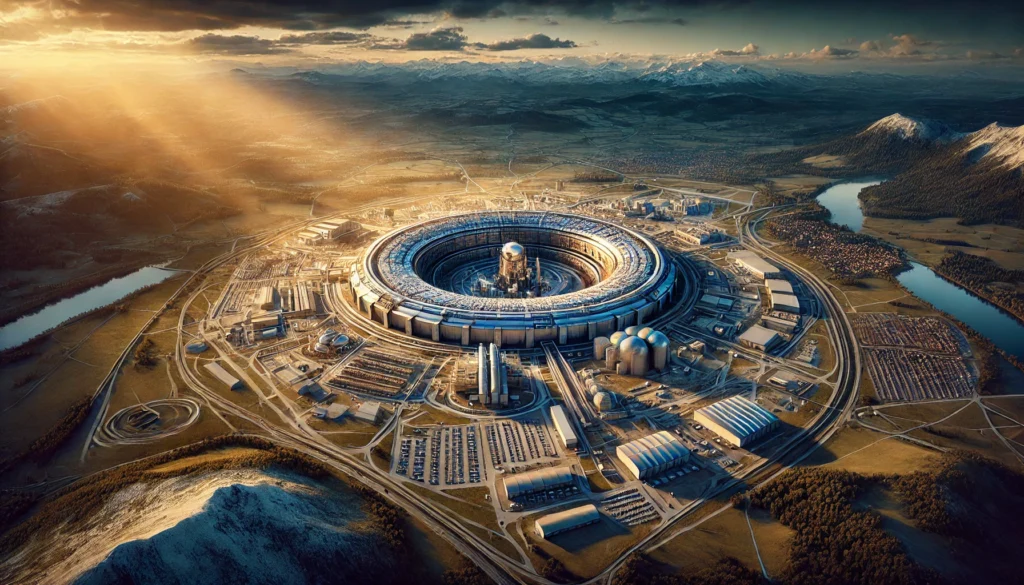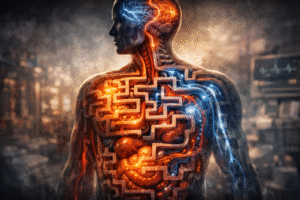Did you know? The Large Hadron Collider (LHC) at CERN (European Organization for Nuclear Research) holds the title of the most powerful particle accelerator on Earth, capable of propelling particles to nearly the speed of light before colliding them!
Imagine a machine so powerful that it can recreate the conditions that existed just moments after the Big Bang. That’s exactly what the Large Hadron Collider (LHC) at CERN does. Located deep underground along the France-Switzerland border, this incredible scientific marvel has been at the forefront of some of the biggest discoveries in modern physics. But what exactly is a super-collider, and why should you care about it? Let’s break it down in simple terms.
What is the Large Hadron Collider?
The LHC is the largest and most powerful particle accelerator ever built. Spanning 27 kilometers in circumference and buried about 100 meters underground, this engineering wonder is operated by CERN, one of the world’s leading scientific research organizations. Its primary role is to accelerate particles—typically protons—and smash them together at extraordinary speeds, allowing scientists to study the fundamental building blocks of the universe.
How Does It Work?
Think of the LHC as a racetrack where protons are the cars, and the goal is to make them crash into each other at mind-blowing speeds. The process happens in several stages:
- Acceleration: Tiny particles called protons are taken from hydrogen atoms and placed into the accelerator.
- Boosting Speed: A series of smaller accelerators push these protons to nearly the speed of light.
- Steering with Magnets: Supercooled electromagnets guide the protons along the circular path.
- Collision: At key points, the protons smash into each other, producing tiny, short-lived particles that offer clues about the universe’s fundamental forces.

The Higgs Boson Discovery
One of the LHC’s most famous achievements was the discovery of the Higgs boson, often referred to as the “God Particle.” In 2012, scientists at CERN confirmed the existence of this elusive particle, which plays a crucial role in explaining why matter has mass. This groundbreaking discovery earned physicists François Englert and Peter Higgs the Nobel Prize in Physics in 2013.
Why is the LHC Important?
Understanding the Origins of the Universe
By smashing particles together, the LHC mimics conditions that existed just after the Big Bang. This allows scientists to study how matter and energy behaved in the earliest moments of time.
Dark Matter and Dark Energy Research
Current scientific models suggest that the matter we see accounts for only about 5% of the universe. The rest is made up of mysterious dark matter and dark energy. The LHC plays a key role in probing these cosmic mysteries.
Developing Advanced Technologies
The technology used to operate the LHC has had unexpected benefits. For example, CERN’s research led to advancements in medical imaging, cancer treatment, and even the development of the World Wide Web!
Inspiring the Next Generation of Scientists
The LHC is a beacon for aspiring physicists, engineers, and mathematicians worldwide. It demonstrates the power of human curiosity and collaboration.
Challenges and Future Plans
Challenges Faced by the LHC
- Cost: Operating the LHC is incredibly expensive, requiring billions of dollars in funding.
- Energy Consumption: It uses vast amounts of electricity to function.
- Data Overload: The collider generates an enormous amount of data, requiring advanced computing power to analyse.
Future Upgrades
CERN is already working on the High Luminosity LHC, an upgrade that will increase the collider’s performance and allow for even more precise experiments. There are also discussions about building an even larger collider in the future, known as the Future Circular Collider (FCC), which could be up to 100 kilometres in circumference!
Conclusion
The Large Hadron Collider at CERN is one of the most exciting scientific tools of our time. It has already expanded our understanding of the universe, and its future discoveries could reshape physics as we know it. Whether it’s answering questions about dark matter, uncovering new particles, or developing groundbreaking technologies, the LHC is a testament to human ingenuity and curiosity. Who knows? The next big discovery could change everything we think we know about reality.
Author’s Note
I hope this article has given you a clearer understanding of the Large Hadron Collider and its importance in modern science. If you’re fascinated by the mysteries of the universe, I encourage you to follow CERN’s latest updates—you never know when the next big discovery will be made!
G.C., Ecosociosphere contributor.
References and Further Reading
- CERN Official Website: https://home.cern
- The Large Hadron Collider Explained: https://www.symmetrymagazine.org
- “Unbelievable Transformation: Man’s Head in Particle Accelerator Sparks Astonishing Consequences!” | Iconoclasmic. https://iconoclasmic.com/unbelievable-transformation-mans-head-in-particle-accelerator-sparks-astonishing-consequences/
- Particle Fever « CineGlobe. http://cineglobe.ch/speakers/particle-fever/
- Advancements in Exploration in the Field of Physics. https://www.primescholars.com/articles/advancements-in-exploration-in-the-field-of-physics-123292.html
- When was the existence of the Higgs Boson confirmed? – Alea Quiz. https://alea-quiz.com/en/when-was-the-existence-of-the-higgs-boson-confirmed/




